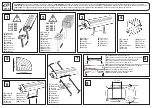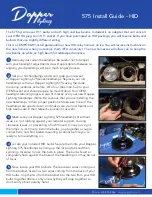
6-3
VEHICLE LOADING AND TOWING
78KS0-37E
Brakes
Tires
Mirrors
Check to see if your vehicle’s mirrors meet
local requirements for mirrors used on tow-
ing vehicles. If they do not, you must install
the required mirrors before you tow.
Vehicle/Trailer Loading
To load your vehicle and trailer properly,
you must know how to measure gross
trailer weight and trailer nose weight.
Gross Trailer Weight is the weight of the
trailer plus all the cargo in it. You can mea-
sure gross trailer weight by putting the fully
loaded trailer on a vehicle scale.
Nose Weight is the downward force
exerted on the tow bar by the trailer cou-
pler, with the trailer fully loaded and the
coupler at its normal towing height. This
weight can be measured using a bathroom
scales.
The weight of your loaded trailer (Gross
Trailer Weight) should never exceed the
“Towing capacity”.
Distribute cargo in your trailer so that nose
weight is about 10% of gross trailer weight,
but does not exceed “Maximum vertical
load on trailer hitch point”. You should
measure gross trailer weight and nose
weight before towing to make sure that
your load is properly distributed.
WARNING
Never connect trailer lights directly
into your vehicle’s electrical system,
or electrical system damage may
occur.
WARNING
If trailer brakes are used, you should
follow all instructions provided by
the manufacturer. Never connect to
the brake system of your vehicle and
never take an electrical supply
directly from the wiring harness.
WARNING
When towing a trailer, it is very
important for your vehicle and trailer
to have properly inflated tires. Your
vehicle’s tires should be inflated to
the pressures listed on your vehicles
Tire Information label. If laden pres-
sures are listed on the label, the tires
should be inflated to the laden pres-
sures. Inflate trailer tires according to
the specifications provided by the
trailer manufacturer.
WARNING
Improper weight distribution of your
trailer may result in poor vehicle han-
dling and swaying of the trailer.
Always make sure that trailer nose
weight is about 10% of gross trailer
weight, but does not exceed “Maxi-
mum vertical load on trailer hitch
point”. Also make sure that the cargo
is properly secured. Failure to
observe this requirement may result
in an accident.
WARNING
Never overload your trailer or your
vehicle. Gross trailer weight must
never exceed the “Towing capacity”.
Gross vehicle weight (sum of the
weights of the vehicle, all the occu-
pants, accessories including tow
bars and a trailer hitch, cargo and
trailer nose weight) must never
exceed the Gross Vehicle Weight Rat-
ing (GVWR) listed in the “SPECIFICA-
TIONS” section.
Trailer Towing: 5, 11
Summary of Contents for GRAND VITARA 2008
Page 8: ...78KS0 37E MEMO...
Page 14: ...ILLUSTRATED TABLE OF CONTENTS 78KS0 37E MEMO...
Page 15: ...FUEL RECOMMENDATION 1 78KS0 37E 65D394 FUEL RECOMMENDATION Fuel Recommendation 1 1...
Page 18: ...1 3 FUEL RECOMMENDATION 78KS0 37E MEMO...
Page 90: ...2 71 BEFORE DRIVING 78KS0 37E MEMO...
Page 130: ...3 39 OPERATING YOUR VEHICLE 78KS0 37E MEMO...
Page 140: ...4 9 DRIVING TIPS 78KS0 37E MEMO...
Page 210: ...5 69 OTHER CONTROLS AND EQUIPMENT 78KS0 37E MEMO...
Page 222: ...6 11 VEHICLE LOADING AND TOWING 78KS0 37E MEMO...
Page 286: ...9 5 APPEARANCE CARE 78KS0 37E MEMO...
Page 287: ...GENERAL INFORMATION 10 78KS0 37E 54G072 GENERAL INFORMATION Vehicle Identification 10 1...
Page 300: ...12 6 INDEX 78KS0 37E MEMO...
Page 301: ...78KS0 37E...
Page 302: ...78KS0 37E...
Page 308: ...78KS0 37E MEMO...
















































